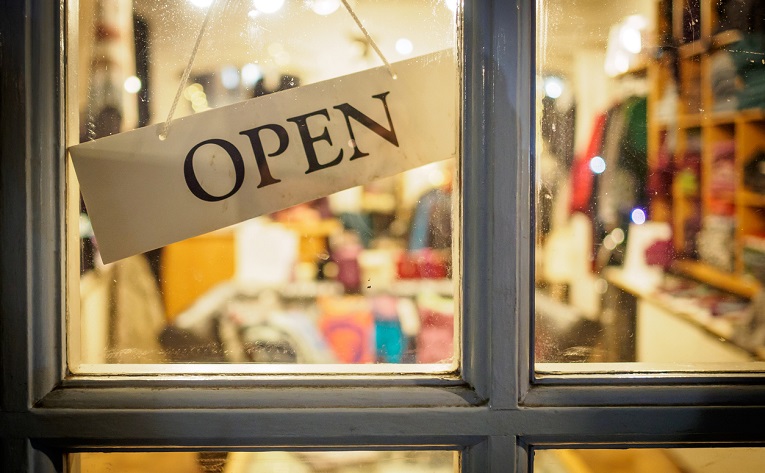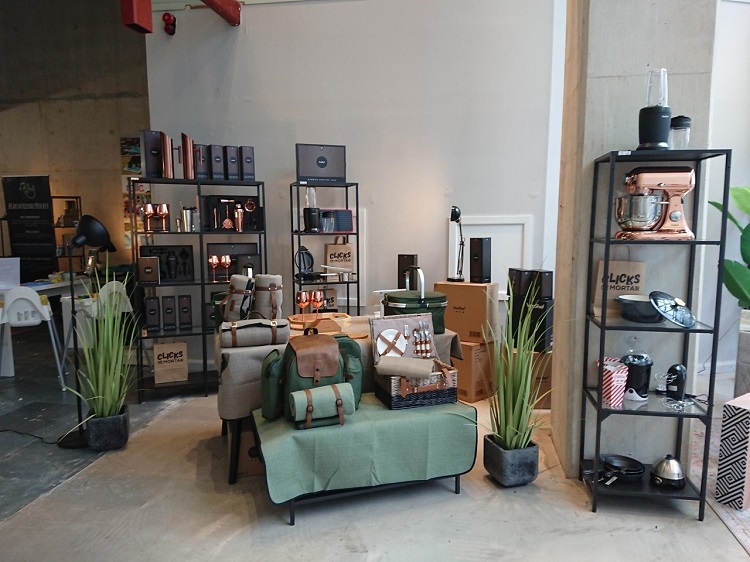How small businesses can make a success of pop-up shops in the post-COVID recovery

Posted: Tue 23rd Mar 2021
With coronavirus restrictions beginning to ease and businesses keen to meet customers face-to-face, there's a renewed interest in pop-up shops. Pop-ups are temporary spaces which allow sellers who don't have their own physical shop the chance to sell products in person and conduct valuable market research.
A study for BBC News and King's College London found that 31% of the 2,200 people surveyed said they will continue to shop locally once the pandemic is over. This shows money being spent in local neighbourhoods could fuel the economic growth of smaller towns and local High Streets. Pop-ups, such as the one Enterprise Nation is launching on London's iconic Oxford in May (places are still available), allows small businesses to benefit.
As part of Enterprise Nation's Hello, World campaign, the free Let's Get Physical event is taking place on 25 March to help small businesses re-engage with customers in a physical format.
Ahead of them joining a panel at the event to share insights on using a pop-up, we asked Becky Jones from Appear Here and John Hoyle from Sook to share some tips. Here's their brilliant advice.
What are your tips for finding the perfect pop-up?
Becky: Understanding your audience is key. Get to know where they live, work and hang out, and meet them there. Check out the analytics of your website or social media accounts if you're not sure where to start. It's never just about footfall, it need sto be the right kind and quality of footfall for your brand. If you can, spend some time in the area you're considering launching a store in, speak to local shopkeepers, grab a coffee and people watch - make sure you understand how footfall and audience change over the course of a day.
John: At Sook we believe that TIME is more important than SPACE. Think about what the right audience for your product or service is. Then establish when and where that audience is most likely to be. If that is not obvious then you probably need to think about how you are going to drive footfall to your space by making what you are doing as visible and exciting as possible.
How can businesses make a success of a pop-up?
Becky: Start with what success actually means to you. Are you looking to build a community, tell a new story, drive revenue, create a social media or PR buzz, test a location for a permanent store?
Define your 'why' and then build your store strategy around this. If you're looking for a PR stunt, a couple of days in a busy high street might be best. If you're looking to test a new location, you'll want to spend more time in the area (3-6 months) to understand the impact of seasonality. Make sure you're launching at a moment in time that's hyper-relevant to your why, and disappear again before that relevance fades.
John: FOMO is a powerful tool that allows you to target customers and make your use of a pop-up cost effective. Promoting a short event is likely to be far more impactful than a long occupation of a space. Its likely to be far more cost effective too. Think about how you can drive a lot of excitement around a short time frame and drive your audience towards you.

What are some common mistakes business owners make when selling in a pop-up?
Becky: Focussing on transactions rather than creating memorable experiences. Give customers a reason to come to into your store instead of buying something online. Try to create an experience that people want to tell their friends about. Tell one story well, and curate your product selection to keep it relevant.
Forgetting to shout about it. Unfortunately, 'Build it and they will come' isn't always the case. Make sure to announce your store well in advance to build excitement with your existing community, share content online once you're up and running, and continue to nurture any new relationships made after you leave. A great comms strategy is particularly important if you're launching for a short amount of time.
John: If you think that taking a space for a week with a static retail offer and no marketing is going to drive success you are likely to be disappointed. Too often brands try to replicate the traditional shop: lots of stuff, expensive fit out, static offer. This is not what a pop-up is necessarily about. It's your chance to stand out and it is a mistake to think just trying to look and feel like a shop is going to achieve this
Can you share some examples of businesses that have made a success of a pop-up?
Becky: Roundtable Books. Aimée Felone and her co-founder David Stephens were frustrated with a lack of representation for BAME characters in children's books, so decided to do something about it. Together they set up Knights Of, a children's publisher whose main focus is publishing inclusively, and launched the Round Table Books popup, creating a bookstore that exclusively stocked titles from underrepresented authors and illustrators, and also worked as a community space for events. The pop-up had such an overwhelming response from the public that it led to crowdfunding a permanent store in Brixton.
Ripndip are an LA-based cult streetwear brand with a growing online community of more than two million, but a firm belief in the value of human interaction. To test demand for European expansion, they launched drop-style popups in London, Paris and Amsterdam all within a three-week period. The industry standard for completing a store booking is 3-6 months; but it took just 3 days on Appear Here. There were hour-long queues outside the stores on opening day.
John: FLIT: An ebike brand. Used a Sook in Cambridge to launch their crowdfund. Turned up with two prototype bikes, a 3D printer and some beer. They were fully funded by the end of the three hour event.
CELIAPOP: A Depop seller. Used a Sook in London to launch her first ever physical shop. Drove her own footfall and in five hours made more sales than any other shop on South Molton Street had done in all of September.
What role do you think pop-ups will play in the post-COVID recovery?
Becky: A bigger one than ever. The last year has rapidly accelerated changes in the property industry, and we're already seeing many more landlords proactively reaching out to us to help them move to a more flexible model. This means that more businesses than ever before will be given flexible access to our streets - and it's this access and diversity that ultimately makes our cities more interesting places to live.
Higher vacancy rates aren't always a bad thing. If done right, it's an opportunity to redefine our cities and introduce a new generation of brands and entrepreneurs to our streets. Towards the end of last year we launched the Save The Street campaign to call for more government support for independent retailers, and as part of this would love to see a matched-funding scheme to help first-time retailers launch a store.
John: Pop-ups will fuel the grass roots recovery of our towns and cities post-COVID. They will be much more about amenity, community, wellness, education, work, art and business than they will be about retail.
Join Let's Get Physical, a free event on 25 March to help small businesses re-engage with customers in a physical format. Sign up here.


